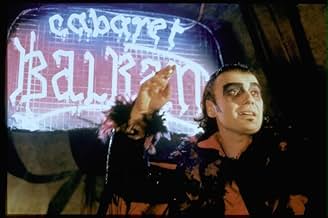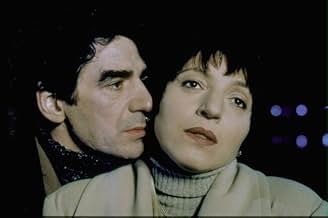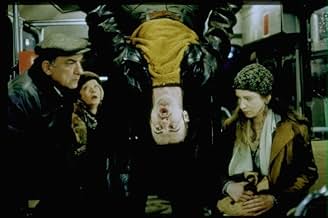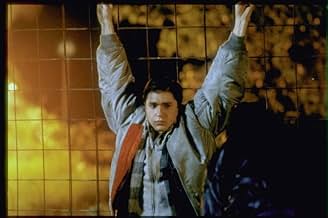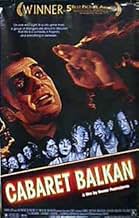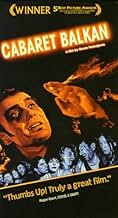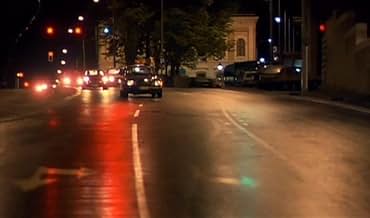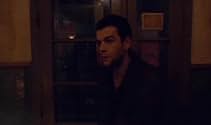IMDb-BEWERTUNG
7,7/10
5875
IHRE BEWERTUNG
Füge eine Handlung in deiner Sprache hinzuRandom Belgrade citizens interact with each other in a night full of crime, frustration, betrayal and revenge.Random Belgrade citizens interact with each other in a night full of crime, frustration, betrayal and revenge.Random Belgrade citizens interact with each other in a night full of crime, frustration, betrayal and revenge.
- Auszeichnungen
- 8 Gewinne & 4 Nominierungen insgesamt
Vojislav 'Voja' Brajovic
- Topi
- (as Vojislav Brajovic)
Predrag 'Miki' Manojlovic
- Mane
- (as Predrag-Miki Manojlovic)
Empfohlene Bewertungen
A great movie. Someone should surely dislike it, but surely it will be impressed in your head and heart like the explosion of millions of bombs...a bang in my heart, absolutely stupend and upsetting...the bombs are inside of everyone, ready to explode and destroy your minds and bodies.
10Zambelli
If you know at least something about the events that took place in former Yugoslavia during the 1990s, you should be able to understand this movie.
Many people have misinterpreted this movie as a vicious depictment of some sick Serbian mentality or an exaggerated vision of a post-war Serbia. None of this is true. The theme of "Cabaret Balkan" is not violence. A great parallel can be made between "Cabaret Balkan" and "A Clockwork Orange". The violence in both movies is not the theme - it's merely an extreme way of proving an important point.
The oppressors and the oppressed. The small fish and the big fish. The dogs and the sheep (rock fans might find interesting similarities between this movie and Pink Floyd's "Animals"). There seems to be certain hierarchy present in "Cabaret Balkan". The passive majority is constantly oppressed by the violent minority, many of whom themselves are victims of "bigger fish". The passive majority is always ready to turn a blind eye, to look the other way or, as a scene from the movie so visually illustrates, sit on a different side of the bus.
Who should the war be blamed on? Is it the government's fault? Or is the fault of the people who elected the government? Should the criminals in power take the blame or the people who let them stay in power? A key scene of the movie which takes place in the bus seems to tell us the most about this issue. "You finally stood up to me", says the young bully to the old man who refuses to play along and answer his insulting questions. In a way, the young bully on the bus is the only real hero of "Cabaret Balkan". He is the only one with the guts to stand up for his rights - everyone else would much rather look the other way, ignore the situation and mind their own business.
The original title of the movie - "Powder Keg", draws its name from an old nickname the Balkan peninsula earned at the beginning of this century - a powder keg ready to explode, with multitudes of people constantly fighting wars, making up, then fighting again. After all, isn't that what all the characters in the movie do? The strange mentality of the Balkan people cannot be easily explained, so director Paskaljevic takes it into extremes and creates extremely surreal scenes, like the one in the boxing ring and the bar. Fight. Drink. Fight. Drink. War. Peace. War. Peace. What's it going to be? Doesn't matter, as long as we're all in "good health".
Many people have misinterpreted this movie as a vicious depictment of some sick Serbian mentality or an exaggerated vision of a post-war Serbia. None of this is true. The theme of "Cabaret Balkan" is not violence. A great parallel can be made between "Cabaret Balkan" and "A Clockwork Orange". The violence in both movies is not the theme - it's merely an extreme way of proving an important point.
The oppressors and the oppressed. The small fish and the big fish. The dogs and the sheep (rock fans might find interesting similarities between this movie and Pink Floyd's "Animals"). There seems to be certain hierarchy present in "Cabaret Balkan". The passive majority is constantly oppressed by the violent minority, many of whom themselves are victims of "bigger fish". The passive majority is always ready to turn a blind eye, to look the other way or, as a scene from the movie so visually illustrates, sit on a different side of the bus.
Who should the war be blamed on? Is it the government's fault? Or is the fault of the people who elected the government? Should the criminals in power take the blame or the people who let them stay in power? A key scene of the movie which takes place in the bus seems to tell us the most about this issue. "You finally stood up to me", says the young bully to the old man who refuses to play along and answer his insulting questions. In a way, the young bully on the bus is the only real hero of "Cabaret Balkan". He is the only one with the guts to stand up for his rights - everyone else would much rather look the other way, ignore the situation and mind their own business.
The original title of the movie - "Powder Keg", draws its name from an old nickname the Balkan peninsula earned at the beginning of this century - a powder keg ready to explode, with multitudes of people constantly fighting wars, making up, then fighting again. After all, isn't that what all the characters in the movie do? The strange mentality of the Balkan people cannot be easily explained, so director Paskaljevic takes it into extremes and creates extremely surreal scenes, like the one in the boxing ring and the bar. Fight. Drink. Fight. Drink. War. Peace. War. Peace. What's it going to be? Doesn't matter, as long as we're all in "good health".
This movie impressed me a lot, however the fine details and message of this movie might very easily escape the unwary viewer. I was lucky to watch the movie with a friend from Ex-Yugoslavia who could point out what exactly lied behind every small gesture or circumstantial hints hidden in a single sentence.
The characters in this movie are in a constant dilemma, half self-inflicted, half caused by higher powers. Yugoslavia at that time is isolated - mentally, economically, morally. There is no valve to let of the steam, so the people take on themselves, murdering, plundering, threatening and raping. Almost every character is shown to be not fully guilty, but nevertheless brought down by their own acts of violence. The bus scene especially shows that the Yugoslavian people have forgotten to take their fate in their own hands. A young men is fed up with the system, his wasted life and the apathy of his people in general. The best scene in the movie for me
Tragic-comically ends this scene like the whole movie. The whole plot takes place one day before the Dayton agreement, another twist of fate, that just on this day those people lose their lives for nothing and absolutely nothing.
When you watch this movie you have to realize the deeper message has been made for the Yugoslavian audience to show them the mechanizations of their lives and their own guilt going with it. He tries to hammer this in the minds of the viewers hence the compressed plot and intermingling of scenes. A masterpiece.
The characters in this movie are in a constant dilemma, half self-inflicted, half caused by higher powers. Yugoslavia at that time is isolated - mentally, economically, morally. There is no valve to let of the steam, so the people take on themselves, murdering, plundering, threatening and raping. Almost every character is shown to be not fully guilty, but nevertheless brought down by their own acts of violence. The bus scene especially shows that the Yugoslavian people have forgotten to take their fate in their own hands. A young men is fed up with the system, his wasted life and the apathy of his people in general. The best scene in the movie for me
Tragic-comically ends this scene like the whole movie. The whole plot takes place one day before the Dayton agreement, another twist of fate, that just on this day those people lose their lives for nothing and absolutely nothing.
When you watch this movie you have to realize the deeper message has been made for the Yugoslavian audience to show them the mechanizations of their lives and their own guilt going with it. He tries to hammer this in the minds of the viewers hence the compressed plot and intermingling of scenes. A masterpiece.
Very bleak and disturbing movie ridden with dark symbolism and utterly depressing resolutions. But what else would you expect from a film depicting a day in Belgrade on the eve of NATO's bombing campaign against Serbia. It is a great film though, but which deals with the dakrest subject matter, focusing on a society in the throws of agony, continuous degradation of the social fabric, and erosion of humanity under extreme conditions.
You can accuse it of being pretentious, self-indulging, or of trying to cover its supposed lack of substance by overwhleming use of violence, but you are living *here* in your cozy apartments, with your salaries and plentiful consumer goods while many people *there* actually experienced the life that is depicted in this movie. "Cabaret Balkan" is one gutwrenching scream of anguish and despair in the face of the harsh reality that people had to endure, and still do, judging by the latest news from Yugoslavia.
You can accuse it of being pretentious, self-indulging, or of trying to cover its supposed lack of substance by overwhleming use of violence, but you are living *here* in your cozy apartments, with your salaries and plentiful consumer goods while many people *there* actually experienced the life that is depicted in this movie. "Cabaret Balkan" is one gutwrenching scream of anguish and despair in the face of the harsh reality that people had to endure, and still do, judging by the latest news from Yugoslavia.
10ereinion
Goran Paskaljevic outdoes himself with this dark, satiric drama-comedy. What he gives us here is Serbia in a nutshell, a post-war Serbia torn with crime, anger and mistrust. "Who's to blame?" is the central question here and the line is spoken several times throughout the movie, once in a particularly hilarious scene. The bus scene is the one that illustrates the situation Serbia and most of former Yugoslavia are in-chaos. There is no one behind the wheel, so everybody is trying to take control.
There is no way to write about this film without saying something about the cast. It consists of all the finest Serbian and Yugoslav actors (two of them, Trifunovic and Glogovac, are from Herzegovina originally and two are from Macedonia) and it is one of the cases where the entire cast is the protagonist. Particularly fine performances come from Miki Manojlovic, Mirjana Jokovic, Mirjana Karanovic, Voja Brajovic, Aleksandar Bercek, Nebojsa Glogovac and Lazar Ristovski. The storyline is incredibly well built and all stories and characters are equally good.
This is a flawless, high quality tragicomedy which will provide you great entertainment and watching experience, as well as a good insight into the situation of this country. It is a humanistic and poignant film with a message, a cry for help. Balkan-a barrell of gunpowder, a-hole of the world.
There is no way to write about this film without saying something about the cast. It consists of all the finest Serbian and Yugoslav actors (two of them, Trifunovic and Glogovac, are from Herzegovina originally and two are from Macedonia) and it is one of the cases where the entire cast is the protagonist. Particularly fine performances come from Miki Manojlovic, Mirjana Jokovic, Mirjana Karanovic, Voja Brajovic, Aleksandar Bercek, Nebojsa Glogovac and Lazar Ristovski. The storyline is incredibly well built and all stories and characters are equally good.
This is a flawless, high quality tragicomedy which will provide you great entertainment and watching experience, as well as a good insight into the situation of this country. It is a humanistic and poignant film with a message, a cry for help. Balkan-a barrell of gunpowder, a-hole of the world.
Wusstest du schon
- WissenswertesFilmed entirely at night.
- SoundtracksFanfare / Duvacki
Orkestar 'Oluja' Sinisa Stankovica
Top-Auswahl
Melde dich zum Bewerten an und greife auf die Watchlist für personalisierte Empfehlungen zu.
- How long is Cabaret Balkan?Powered by Alexa
Details
- Erscheinungsdatum
- Herkunftsländer
- Offizieller Standort
- Sprache
- Auch bekannt als
- Cabaret Balkan
- Drehorte
- Produktionsfirmen
- Weitere beteiligte Unternehmen bei IMDbPro anzeigen
Box Office
- Bruttoertrag in den USA und Kanada
- 108.103 $
- Eröffnungswochenende in den USA und in Kanada
- 11.774 $
- 25. Juli 1999
- Laufzeit1 Stunde 42 Minuten
- Farbe
- Sound-Mix
- Seitenverhältnis
- 1.85 : 1
Zu dieser Seite beitragen
Bearbeitung vorschlagen oder fehlenden Inhalt hinzufügen


